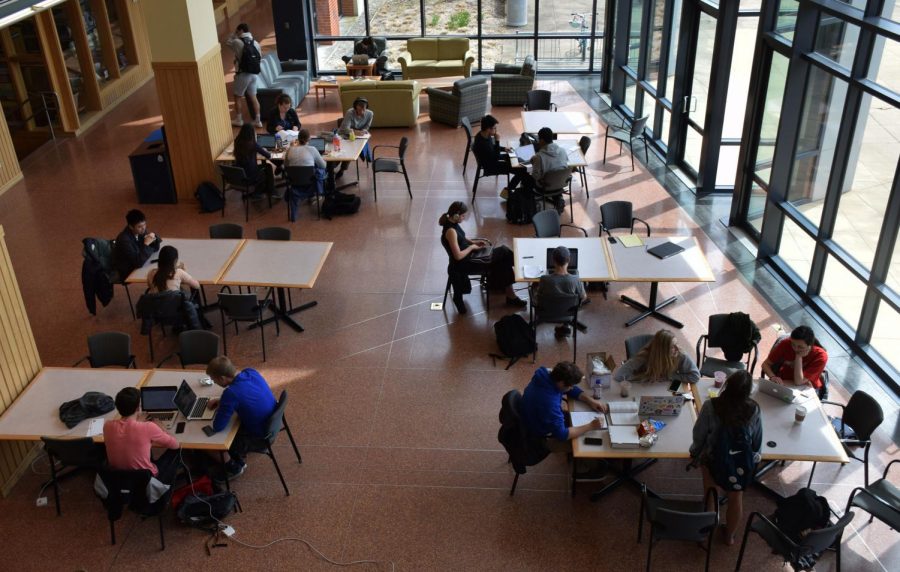Global Health, Business Concentrations Proposed
Students working in the Science Center, where future global health classes could be offered for a proposed new academic concentration.
An area of recommendation from the Academic and Administration Program Review steering committee has sparked a conversation about two potential new academic concentrations — one in Business and one in Global Health. The AAPR believes that adding these concentrations would both attract potential students to Oberlin and increase retention among current students.
The AAPR’s Summary of Work to Date document, made public to students March 29, claims that more than a third of prospective students rated their interest in business to be a four or five out of five. Additionally, 42 percent of returning Oberlin students said they were interested in a Global Health program.
Associate Dean of the College of Arts and Sciences Laura Baudot explained that the concentration model is unique in a number of ways.
“The model of the integrative concentration — roughly speaking five courses plus a co-curricular experience such as an internship is itself, in my opinion, an exciting curricular model,” Baudot wrote in an email to the Review. “Concentrations are a great way for the institution to explore emerging fields and to respond to evolving student and faculty interests. I will also stress that ideas for concentrations tend to be grassroots efforts on the part of faculty, and, as such, expressions of the intellectual creativity and collaborative energy on campus.”
Ron Cheung, professor and chair of the Economics department and a member of the AAPR steering committee, said that the AAPR suggested that a concentration would be the most beneficial way of preparing students in business.
“We decided that a full-on major in business is not the way to go because it kind of doesn’t fit in well with the character of Oberlin,” Cheung said.
Cheung also mentioned that Conservatory students might find a business concentration beneficial because many musicians are self-employed.
“Conservatory students are basically going to leave their Oberlin experience and become self-employed,” Chueng said. “Basically you’re trying to market yourself, and a lot of them are interested in things like entrepreneurship.”
Associate Dean of Students Dana Hamdan hopes the potential programs — both Global Health and Business — could offer students the chance to gain experience and learn both inside and outside of the classroom as well as better prepare them for life after graduation.
“If the faculty governance committees decide to move forward with the integrative concentrations proposed by AAPR, it will allow us to do something we have never done before, namely, to collaborate with curricular committees on how to be strategic in preparing our students to launch from Oberlin,” Hamdan wrote in an email to the Review. “Our faculty do an exceptional job inside the classroom and preparing them for graduate schools, but what the integrative concentrations do is ask faculty to [help] our students transition from college to career.”
Associate Professor of Anthropology Cal Biruk, who does research in fields such as medical anthropology and global health studies, said she is hoping to see the proposed programs have an interdisciplinary approach to global health education.
“I am excited at the prospect of Oberlin building a Global Health program or concentration that has at its core a social justice and critical approach to the study and practice of global and public health,” Biruk wrote in an email to the Review. “As an anthropologist, I hope to play a role in ensuring that any Global Health programming at Oberlin incorporates critical perspectives on health, healing, medicine, [and] the body and is attentive to the racialized, imperial, and sometimes violent histories of research and medicine here in the U.S. and abroad.”
In addition to the Global Health concentration, the AAPR’s Summary of Work to Date mentioned that there is interest in an Oberlin-affiliated Master’s degree program, expressing that Oberlin students might find a program for them to earn both an undergraduate degree as well as a Master’s in Public Health in five years to be appealing.
College senior and pre-medical student Kirsten Mojziszek said she would have enjoyed the opportunity to experience a Global Health concentration and hopes younger students will take advantage of the program if it is offered.
“I think the people who are here who want to go to med school are thinking about medicine in terms of what can we do better in the future,” Mojziszek said.
The AAPR’s Summary of Work to Date document recommends adding one faculty line for the Business concentration, but doesn’t mention new hires for the Global Health concentration. If the proposed concentrations become part of Oberlin’s curriculum, faculty governance committees will have to make crucial decisions about how to use existing resources as well as where new resources might be needed.
“[The] Educational Plans and Policies Committee is currently in conversation with the AAPR steering committee about the two recommended Integrative Concentrations,” wrote Baudot. “In the next couple weeks, the AAPR steering committee will use the feedback from these discussions to craft recommendations regarding these Integrative Concentrations which will then come before EPPC. Most likely in the next academic year, EPPC will vet the particular concentration proposals, which will include all the key curricular elements of the concentration such as the specific courses and concentration requirements.”







